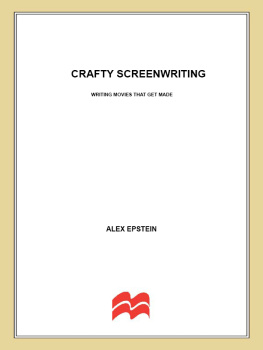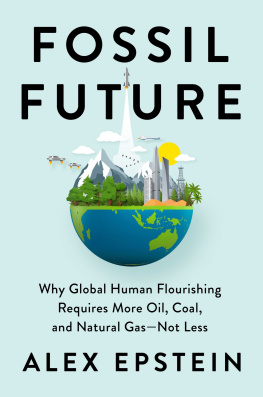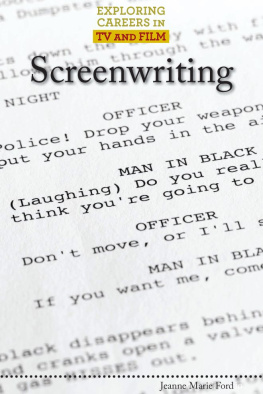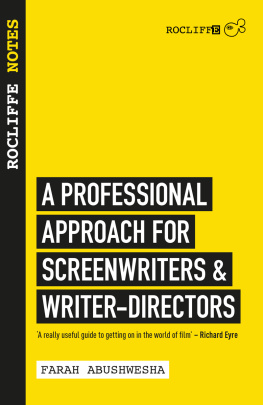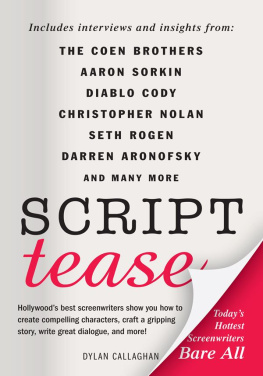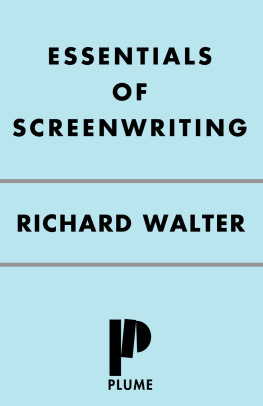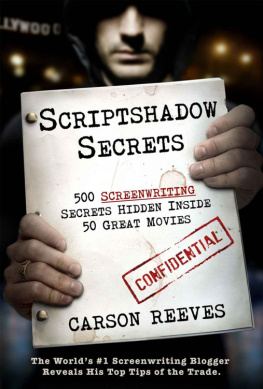The author and publisher have provided this e-book to you for your personal use only. You may not make this e-book publicly available in any way. Copyright infringement is against the law. If you believe the copy of this e-book you are reading infringes on the authors copyright, please notify the publisher at: us.macmillanusa.com/piracy.
Chapter One
HOOK
Whats a screenplay? Good question. After all, if youre going to write one, you ought to know the answer. Right?
You probably already know an answer. A screenplay is writing intended to be turned into film . Its a hundred-odd pages held together by brass brads, in which you have written down whatever you want the audience to see and hear in that big dark room.
If it gets made, the director will come up with a whole new vision, the actors will change your dialogue, the editor will concoct another way to order the scenes, and it wont be your movie any more. Thats okay. A screenplay is not a complete work. It is not intended to be appreciated on its own. If a movie were a building, a screenplay would be the blueprint. Nobody settles down in front of a roaring fire with her beloved, a bottle of Chianti, and a nice blueprint. Nobody takes a couple of good screenplays out to the beach except for show business people, anyway.
That means there is no point writing a screenplay if it isnt going to get produced.
We all know that, somewhere in the back of our minds, but most of the thousands of screenplays Ive read in ten years as a development executive were never in any danger of being made into a movie. From the moment the writer conceived them, they were doomed . They may have been well-crafted or poorly crafted, but they were all missing what they needed in order to get made.
This book is about writing movies that get made. Not just popular movies. Art films get made, too. Writing a screenplay that will make a brilliant movie is a good part of writing a movie that will get made, and thats what most of this book is about. But thats not all of it. So its important to understand what else a screenplay is, if youre going to go to all the trouble of writing one, because if you dont, the odds are youre wasting your time.
A SCREENPLAY IS PART OF A PACKAGE
A screenplay is the first element in what the movie business calls a package . A package is a combination of:
- some story material a book, a screenplay, even just a concept, plus
- a star actor and/or a star director
A package is made of creative elements that movie people are betting the audience will want to see in movie theaters or on their TVs.
A screenplay is an element in a deal .
Show business has a split personality. It is a business , which means people are not in it for their health. When movies flop, people lose their jobs. Unsuccessful directors have to go back to shooting commercials. Unsuccessful actresses have to go back to waiting tables, or marry carpet salesmen. Unsuccessful producers have to go back to selling carpets. Its not surprising how crassly commercial the movies are. Whats surprising is that theyre not more crassly commercial.
Very few people go into the motion picture industry because they want above all to make a lot of money. The moneys great if youre working, but really, if you just want to make money, you might as well be selling Porsches or oil drilling equipment. Practically everyone in the business got into it because they love movies. Screenwriters want to tell stories. Producers want to put good movies on the screen. Actors want to indulge their most extreme emotions in front of a crowd of people, so think twice about dating one. Practically everyone in the motion picture industry is trying to make good movies. Theyre not all trying to make great art, but if they had the choice, most of them would rather make a movie that will last.
Every motion picture project starts with a bit of commerce and bit of art.
In theory, a motion picture project begins when someone working in development at a motion picture studio or production company reads a wonderful screenplay. Development is the stage of the movie-making process when screenplays get optioned, bought, rewritten, rewritten, rewritten, and usually buried. This reader is likely someone called, believe it or not, a reader often a recent film school grad who gets paid $40 a pop to write two to five pages of synopsis and scornful commentary. If the reader likes it, he might alert a story editor, who brings it to the attention of a development executive, who gives it to a production executive at a studio or a producer at a production company.
Once a deal is struck, the production exec or producer sends the script out to a director, who, hopefully, sparks to the material and agrees to direct the script. Then the script goes to stars. Once a big enough star agrees to do the picture, the studio agrees to fund the picture, and were off to the races.
Your screenplay does not get made into a movie until all of these people say yes: the reader, the story editor, the development exec, the production exec, the director, and the star. If the production exec, the development exec, the story editor, or the reader got out of bed on the wrong side that morning, your project is dead at that studio or production company.
(If Tom Cruise sends in a friends screenplay, then it skips to the top. The production exec reads it and automatically likes it, it gets optioned, and if Tom agrees to star in it, it gets made. More about that in a bit.)
A screenplay is a selling tool . It is a salesman for the movie. It sells your story to people youve never met, whom youll never meet, some of whom are in a permanently bad mood because you can write and they cant. It has to sell to a reader whos just out of film school and thinks he knows everything about what makes a great movie. It has to sell to a story editor up past midnight trying to finish her stack of scripts so she can make love to her boyfriend before he goes into REM sleep. It has to sell to a production exec who brought home two scripts: yours, and one Tom Hanks wants to do. It has to sell to an actor who is terrified of getting old. It has to convince all of these cranky people that it is a movie just dying to be made.
So, a screenplay is a blueprint, an element in a deal, and a sales tool.
What gets your screenplay through the gauntlet? If you read most screenwriting books, the answer is something like this:
| Structure: | A good, fresh, well-told story that makes sense. |
| Characters: | Interesting, fleshed-out characters with the breath of life in them. |
| Dialogue: | Good, realistic dialogue that gives voice to the characters. |
| Pacing: | Rising tension that reaches a dramatic climax. |
Nah.
These things dont get you past the gatekeepers. Oh, sure, youll want to haveem in your screenplay. But what actually gets you through is a great hook .
THE HOOK
A hook is the concept of the picture in a nutshell. Not just any concept. A hook is a fresh idea for a story that instantly makes show business people interested in reading your script, and then makes the audience want to see your movie.
Here are some good hooks:
- A man is about to commit suicide when an angel shows him what his town would be like if he had never lived. ( Its a Wonderful Life )
- Two people who hate each other write each other anonymously and fall in love. ( The Shop Around the Corner, Youve Got Mail )

